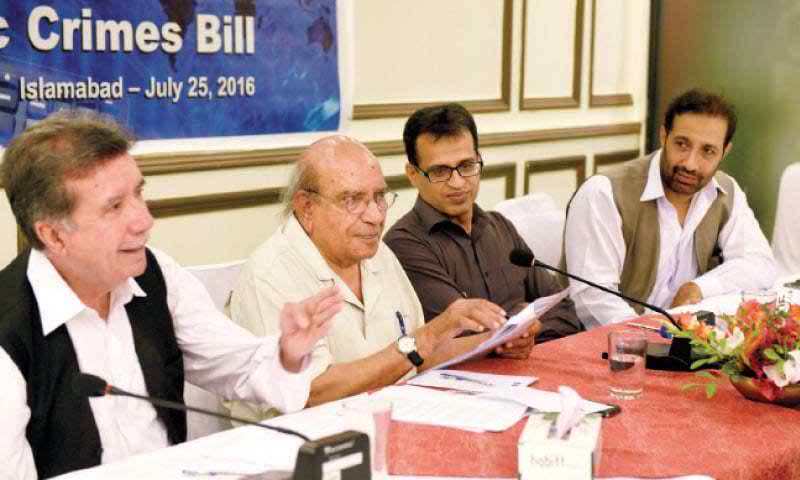ISLAMABAD ( MEDIA REPORT )
Despite robust efforts by lawmakers and civil society, it appears that the Prevention of Electronic Crimes Bill (PECB) 2015 may soon be laid before the Senate without being amended to the satisfaction of all concerned.
The bill is likely to be referred to the Senate by the Standing Committee on Information Technology and Telecommunication today (Tuesday), along with amendments to the draft law that were proposed by lawmakers and stakeholders.
The PECB was passed by the National Assembly on April 13 this year. Under the Constitution, the Senate must ratify the bill within 90 days. If the bill lapses, it will most likely be sent to a joint sitting of both houses of parliament, where the ruling PML-N can use its majority to bulldoze the legislation.
In a last ditch attempt to consolidate civil society’s position on the bill and highlight objections on contentious clauses, the Human Rights Commission of Pakistan (HRCP) has decided to write to Prime Minister Nawaz Sharif, Senate Chairman Raza Rabbani, as well as leaders of all parliamentary parties.
This suggestion was put forward on Monday by ANP’s Afrasiab Khattak and Bushra Gohar at a consultation on the proposed law, who pointed out that it was too late for an exhaustive academic discussion on the matter.
Former HRCP chairperson I.A. Rehman noted that no other bill had been discussed so much for so long by so many people, adding that this was because the law seeks to control the “medium of tomorrow”.
But despite this, the government had resisted attempts by stakeholders to plug potential loopholes in the draft and has instead taken to questioning their motives rather than appreciating their efforts, he said.
He recommended that the PTA be taken out of government control if it was to be the implementing authority for this law, saying that otherwise, “the government can issue instructions to it from time to time and it will have no choice but to comply.”
Participants discussed sections that were most contentious, and presented alternative formulations. On Section 9, which relates to ‘Glorification of an offense or hate speech’, it was recommended that the provision be removed, short of which glorification of an accused person should not be criminalised, and that hate speech, which is not adequately covered in the section, should be dealt with separately.
Mr Rehman also pointed out that when read with Section 10, ‘Cyber-terrorism’, the law amounted to the creation of a new anti-terrorism law for cyberspace.
“The more words you use in a law, the more confusing and open to interpretation they become. We read about good laws in textbooks because we have not been fortunate enough to see any enacted in Pakistan,” Mr Rehman mused as he criticised Section 18, which has widely been derided as an attempt to make another defamation law for cyberspace.
He was of the view that the defamation ordinance and relevant sections of the penal code should be applicable to online spaces as well, saying: “Whatever is a crime in the Pakistan Penal Code (PPC), leave it there.”
Chaudhry Mohammed Shafiq, a member of the National Commission on Human Rights (NCHR), echoed this view, saying: “There is no need to confuse our jurisprudence through duplication [of offences].”
On Section 19, which deals with ‘Offences against modesty of a natural person or minor’, Sadaf Baig of Media Matters for Democracy (MMfD) suggested that minors and adults be dealt with separately, with the laws dealing with minors being as strict as possible.
MMfD’s Asad Baig voiced his concerns over Section 29, which deals with ‘Retention of traffic data’, by pointing out that metadata such as phone numbers and an individual’s location could be misused to target journalists’ sources and whistleblowers. Other participants also noted that there was a lack of safeguards to prevent misuse of the users’ data.
Taking issue with the sweeping powers assigned to investigating officers in Section 32, NCHR’s Mr Shafiq maintained that “all punitive action should be subject to a court order”, which was not currently the case.
Mr Baig also noted that in cases of overlap with other laws, the punishment suggested in the PECB 2015 were often harsher than those stipulated in the penal code.
In the case of Section 34, which deals with ‘Power to manage online information’, everyone agreed that the provision should be omitted as it dealt with matters that should be covered by the Telecommunication act.
Haroon Baloch from Bytes for All pointed out that there was a complete dearth of constitutional safeguards in the bill.
It was also pointed out that in Section 36, which deals with ‘Real-time collection and recording of information’, the criteria for surveillance is even more open-ended than in the Fair Trial Act 2013, which was also a cause for concern.
Published in Dawn, July 26th, 2016

